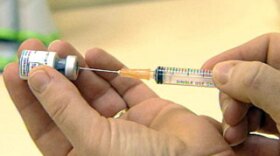Updated Oct. 2, 10 a.m.: UNC Charlotte reports that evidence of SARS-CoV-2, the virus that causes COVID-19, was found in its routine sampling in one residence hall. All students in that hall were told to quarantine until they could be tested for COVID-19.
How do you prevent the coronavirus from spreading inside a college dorm? UNC Charlotte thinks it's found an answer, and it's down in the dorm's basement, flowing through a sewage pipe.
That's right: wastewater. It's the grayish-brown mixture of all the water flushed out of the dorm's showers, sinks, water fountains and, yes, toilets.
"It's actually not a very strong smell," said research associate Kevin Lambirth. "You would have worse experiences in your own restroom."
For the last few weeks, Lambirth has been scurrying around what he calls the "underbelly" of the university opening up these sewage pipes and rigging them with sample collection kits.
"We have 16 of these in the physical dorms, and then we have several in the Greek village, where we're actually going to be accessing directly through manholes," he said.
The idea is that researchers collect samples from the sewage flowing out of each dorm then test those samples for the coronavirus.
If the test comes back negative, the students in that dorm are probably healthy. If the test comes back positive, someone in that dorm may have become infected. What then?

"We'll call up the testing team and say, 'OK, we have a positive in this dorm, so you might want to take those students and give them all a test,'" said professor Cynthia Gibas, who's helping to lead the project.
She hopes it will be like an early warning system for the university, alerting administrators of possible cases inside a dorm so students can be quickly tested and isolated. It will also save the school from having to test every student every day.
The program has its limitations, though. Commuter students are left out. So are faculty and staff who live off campus, and Gibas said the university doesn't yet have 100% coverage of the dorms.
"There's always going to be population that we're not really going to be able to test with this," she said. "There will be some that slip by."
But some coverage is better than none and the approach has been effective at other universities.
At the University of Arizona, administrators held a press conference touting the effectiveness of testing wastewater. They said it likely stopped an outbreak from happening after the coronavirus was detected in one dorm's sewage. Students there were tested, and Richard Carmona, who leads the school's reentry task force, said two asymptomatic students were identified and quickly isolated.
"If you think about, if we had missed it if we have waited until they became symptomatic and they stayed in that dorm for days or a week or the whole incubation period, how many other people would have been infected?" Carmona said.
The University of South Carolina, too, has been testing students' sewage ever since they returned to campus in August. The program identified multiple cases, said associate professor Sean Norman.
"We can say that we have identified in some of the areas where we have seen positives, we have identified cases within those areas and those people would be asked to quarantine," he said.

Students, for their part, say it's a little weird that everything they flush down the toilet is now the subject of scrutiny. University of South Carolina sophomore Yasmen Balogun didn't believe it when she first heard about it.
"Just like, thinking about someone testing your poop, it's not a very pleasant idea," she said.
But then again, it's not the weirdest thing to have happened in this crazy year, and what matters is if it's effective.
"If it works, it works, you know?" she said. "It's just weird thinking about that kind of thing happening in real life."
Plans are already in the works to expand this kind of testing beyond college campuses. Some towns around South Carolina and other places like Waco and Denton in Texas and Alameda County, California, have started testing sewage with the help of the University of South Carolina.
UNC Charlotte also hopes to expand testing into off-campus apartments and other locations near the university in the coming months.
Copyright 2021 WFAE. To see more, visit WFAE. 9(MDAxNzg0MDExMDEyMTYyMjc1MDE3NGVmMw004))






